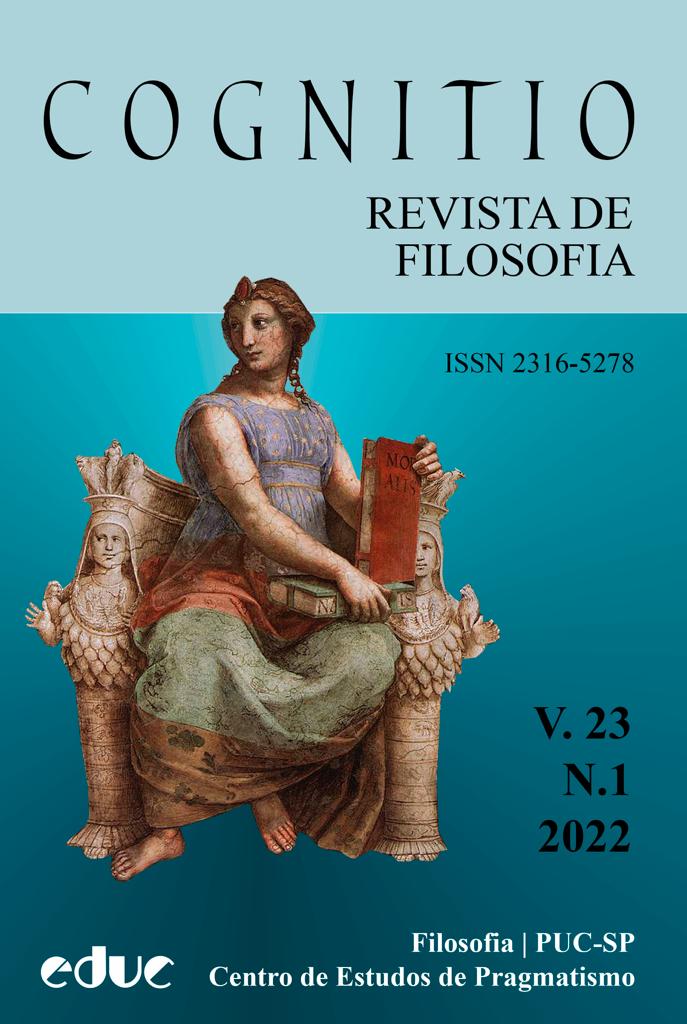Entre pessoas
sobre a possibilidade de uma epistemologia da conversação
DOI:
https://doi.org/10.23925/2316-5278.2022v23i1:e58222Resumo
Este artigo argumenta que uma Epistemologia da Conversação deve ser compreendida como um campo da Epistemologia Social que se dedica a investigar as normas estritamente epistêmicas que regem a interação entre duas ou mais pessoas acerca de suas crenças e outros estados epistêmicos. Uma definição elementar de conversação é: um ato comunicativo cooperativo nos quais os participantes assumem propósitos comuns e o compromisso de contribuir com declarações (asserções) relevantes. Partindo dessa definição elementar, o artigo apresenta quatro temas que deveriam ser considerados por uma Epistemologia da Conversação: a) que o desacordo é um motivo relevante para a conversação; b) que a conversação é um meio ou método de investigação em casos de desacordo entre pares; c) que as virtudes esperadas dos participantes são virtudes epistêmicas; e d) que qualquer resultado de uma conversação realizará um bem epistêmico.
Referências
BRONCANO-BERROCAL, Fernando; CARTER, J. Adam. (eds.). The epistemology of group disagreement. New York; London: Routledge, 2021.
CHRISTENSEN, David; LACKEY, Jennifer. The epistemology of disagreement. New York: Oxford University Press, 2013.
COADY, C. A. J. Testimony: A philosophical study. New York: Oxford University Press, 1994.
COLLINS, Stephanie. Group duties: their existence and their implications for individuals. Oxford: Oxford University Press, 2019.
CRAIG, Edward. Knowledge and the state of nature: an essay in conceptual synthesis. Oxford: Oxford University Press, 1990.
EDENBERG, Elizabeth; HANNON, Michael. (eds.). Political epistemology. Oxford: Oxford University Press, 2021.
FELDMAN, Richard; WARFIELD, Ted. Disagreement. New York: Oxford University Press, 2010.
FRANCES, Bryan. Disagreement. Cambridge: Polity, 2014.
FRICKER, Miranda. Epistemic injustice: power and the ethics of knowing. Oxford: Oxford University Press, 2006.
GOLDBERG, Sanford C. Assertion: on the philosophical significance of assertoric speech. Oxford: Oxford University Press, 2010.
GOLDBERG, Sanford. C. Conversational pressure. Oxford: Oxford University Press, 2020.
GOLDMAN, Alvin I.; WHITCOMB, Dennis (eds). Social epistemology: essential readings. New York: Oxford University Press, 2011.
GRICE, H. Paul. Studies in the way of words. Cambridge, MA: Harvard University Press, 1989.
HAMPSHIRE, Stuart. Freedom of the individual. London: Chatto & Windus, 1965.
HANNON, Michael; RIDDER, Jeroen de. The Routdlege Handbook of Political Epistemology. New York; London: Routledge, 2021.
HOOKWAY, Christopher. How to be a virtue epistemologist. In: DEPAUL, M.; ZAGZEBSKI, L. (ed.). Intellectual virtue: perspectives from ethics and epistemology. Oxford: Oxford University Press, 2003. p. 183-202.
JOHNSON, Cassey R. (ed.). Voicing dissent: the ethics and epistemology of making disagreement public. New York, London: Routledge, 2018.
LACKEY, Jennifer. Learning from words: testimony as a source of knowledge. Oxford: Oxford University Press, 2008.
LACKEY, Jennifer; SOSA, Ernest (eds.). The epistemology of testimony. Oxford: Oxford University Press, 2006.
LAKEY, Jennifer. The epistemology of groups. Oxford: Oxford University Press, 2021.
MCKINNON, Rachel. The norms of assertion: truth, lies, and warrant. London: Palgrave Macmillan, 2015.
MORAN, Richard. Authority and estrangement: an essay on self-knowledge. Princeton, Oxford: Princeton University Press, 2001.
MORAN, Richard. The exchange of words: speech, testimony, and intersubjectivity. Oxford: Oxford University Press, 2018.
SEARLE, John. Expression and meaning. Cambridge: Cambridge University Press, 1979.
SPERBER, Dan; WILSON, Deirdre. Relevance: communication and cognition. Second Edition. Oxford, Cambridge, MA: Blackwell, 1995.
TANESINI, Alessandra. The mismeasure of the self: a study in vice epistemology. Oxford: Oxford University Press, 2021.
TANESINI, Alessandra; LYNCH, Michael P. (eds.). Polarisation, arrogance, and dogmatism: philosophical perspectives. New York, London: Routledge, 2021.
WELBOURNE, Michael. The Community of Knowledge. Philosophical Quarterly, [s. l.], v. 31, n. 125, p. 302-314, 1981. DOI: https://doi.org/10.2307/2219401.
Downloads
Publicado
Como Citar
Edição
Seção
Licença
Copyright (c) 2022 http://creativecommons.org/licenses/by/4.0/

Este trabalho está licenciado sob uma licença Creative Commons Attribution 4.0 International License.









